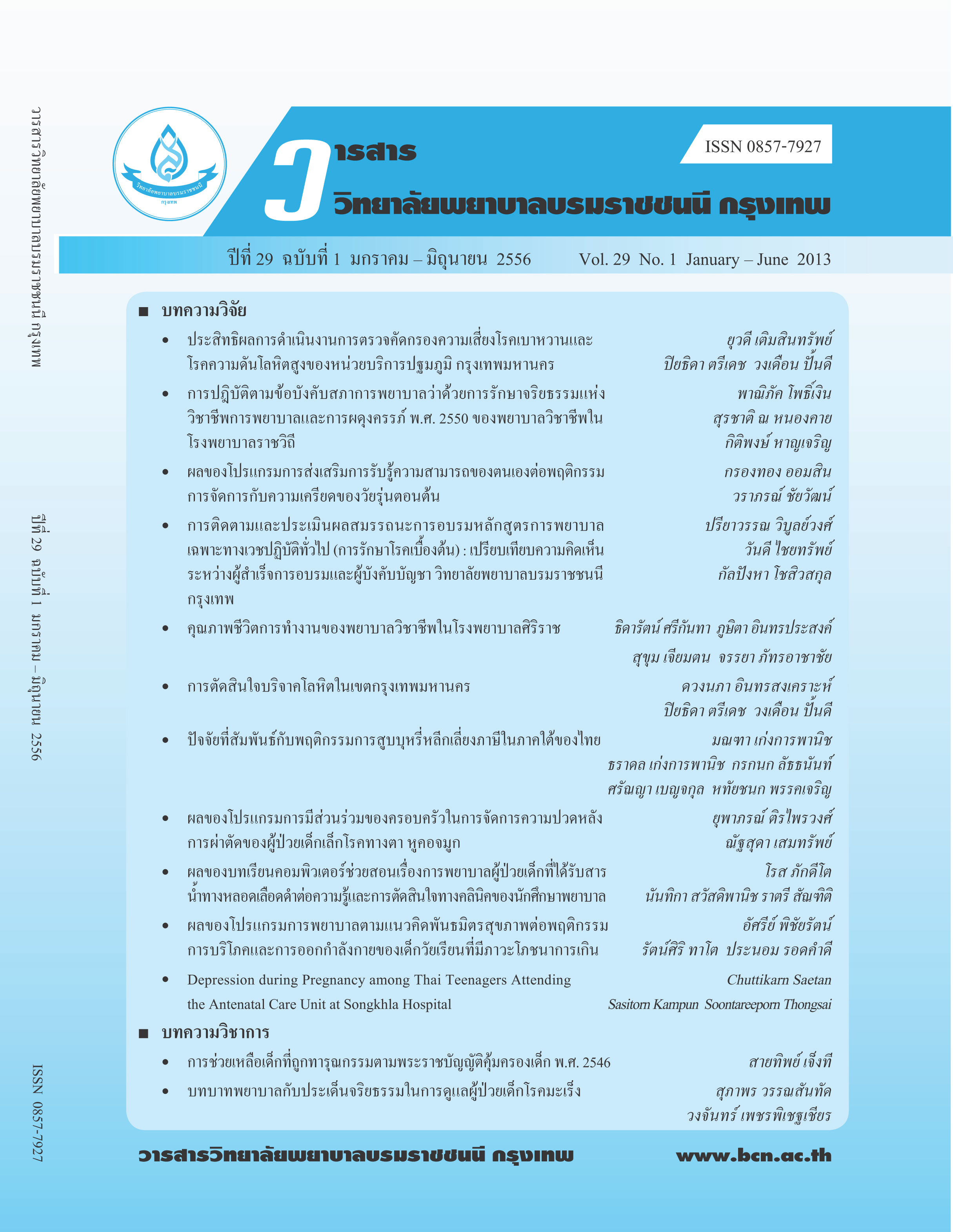ผลของโปรแกรมการส่งเสริมการรับรู้ความสามารถของตนเอง ต่อพฤติกรรมการจัดการกับความเครียดของวัยรุ่นตอนต้น THE EFFECT OF PERCEIVED SELF-EFFICACY PROMOTING PROGRAM ON STRESS MANAGEMENT BEHAVIORS OF EARLY ADOLESCENTS
คำสำคัญ:
วัยรุ่นตอนต้น, การรับรู้ความสามารถของตนเอง, พฤติกรรมการจัดการความเครียด, EARLY ADOLESCENTS, PERCEIVED SELF-EFFICACY, STRESS MANAGEMENTบทคัดย่อ
บทคัดย่อ
การวิจัยครั้งนี้มีวัตถุประสงค์ เพื่อศึกษาผลของโปรแกรมการส่งเสริมการรับรู้ความสามารถของตนเองต่อพฤติกรรมการจัดการกับความเครียดของวัยรุ่นตอนต้น กลุ่มตัวอย่างคือ นักเรียนมัธยมศึกษาชั้นปีที่ 1 จำนวน 61 คน จาก 2 โรงเรียนในจังหวัดสุราษฎร์ธานี โดยนักเรียน 31 คนจากโรงเรียนหนึ่งเป็นกลุ่มทดลอง และนักเรียน 30 คน จากอีกโรงเรียนหนึ่งเป็นกลุ่มควบคุม กลุ่มทดลองได้รับโปรแกรมการส่งเสริมการรับรู้ความสามารถของตนเองในการจัดการกับความเครียด ประกอบด้วยการอภิปรายกลุ่มย่อยและการทดลองปฏิบัติจริง เก็บรวบรวมข้อมูลโดยใช้แบบสอบถามพฤติกรรมการจัดการกับความเครียดในเด็กวัยรุ่นตอนต้นที่ผู้วิจัยสร้างขึ้น ก่อนและหลังการทดลอง วิเคราะห์ข้อมูลโดยใช้สถิติ Dependent t – test และ Independent t – test
ผลการวิจัยพบว่า
1.วัยรุ่นตอนต้นที่ได้รับโปรแกรมการส่งเสริมการรับรู้ความสามารถของตนเอง หลังการทดลอง 2 สัปดาห์ มีคะแนนเฉลี่ยพฤติกรรมการจัดการกับความเครียดหลังการได้รับโปรแกรมการส่งเสริมการรับรู้ความสามารถของตนเอง ( M= 74.84 , S.D = 7.88) ดีกว่าก่อนการได้รับโปรแกรม (M = 59.23, S.D = 7.86) อย่างมีนัยสำคัญทางสถิติ (t (df) = -8.39, p ‹ .001)
2.วัยรุ่นตอนต้นที่ได้รับโปรแกรมการส่งเสริมการรับรู้ความสามารถของตนเอง หลังการทดลอง 2 สัปดาห์ มีคะแนนเฉลี่ยพฤติกรรมการจัดการกับความเครียดภายหลังการทดลอง (M = 74.84, S.D = 7.88) ดีกว่าวัยรุ่นตอนต้นที่ได้รับการส่งเสริมพฤติกรรมการจัดการกับความเครียดตามปกติ (M = 59.13, SD = 11.343) อย่างมีนัยสำคัญทางสถิติ (t(df) = 6.30, p ‹ .001)
จากผลการวิจัย การจัดโปรแกรมการส่งเสริมการรับรู้ความสามารถของตนเองสามารถช่วยในการจัดการความเครียดในวัยรุ่นได้ และควรนำไปทดลองใช้ส่งเสริมพฤติกรรมสุขภาพกับกลุ่มตัวอย่างอื่น เช่น มารดาวัยรุ่น หรือ ผู้ป่วยเด็กวัยรุ่น เป็นต้น
Abstract
The purpose of this quasi-experimental research was to examine the effect of perceived self-efficacy promoting program on stress management behaviors of early adolescents. Subjects were composed of 61 seventh- grade students from two schools in Surattani Province, 31 students from one school were assigned to the experimental group and 30 students from the other were assigned to the control group. The experimental group received the perceived self-efficacy promoting program. Activities of the promoting program consisted of a small group discussion, and experimental application of the perceived self-efficacy. The stress management behaviors questionnaire developed by the researcher was used to measured stress management of the students twice, before and after receiving the program. Data were analyzed by dependent t – test and independent t - test.
The results were follows:
Stress management behaviors scores of early adolescents two weeks after receiving the perceived self-efficacy promoting program (M= 74.84, SD = 7.88) was significantly higher than those before receiving the program (M= 59.23, SD = 7.86), t (df) = -8.39, p ‹ .001). Stress management behaviors scores of early adolescents two weeks after receiving the perceived self-efficacy promoting program (M= 74.84, SD = 7.88) was significantly higher than those of the students receiving routine stress management promotion (M = 59.13, SD = 11.34), (t (df)= 6.30, p ‹ .001). The findings of this study suggested that the promoting program helps to decrease stress in adolescent and this program should be examined in other groups such as teenage mothers or adolescent with chronic illness.
Downloads
ดาวน์โหลด
เผยแพร่แล้ว
รูปแบบการอ้างอิง
ฉบับ
ประเภทบทความ
สัญญาอนุญาต
บทความที่ได้รับการตีพิมพ์ เป็นลิขสิทธิ์ของวารสารวิจัยสุขภาพและการพยาบาล (วิทยาลัยพยาบาลบรมราชชนนี กรุงเทพ) ไม่สามารถนำไปตีพิมพ์ซ้ำในวารสารฉบับอื่น


















